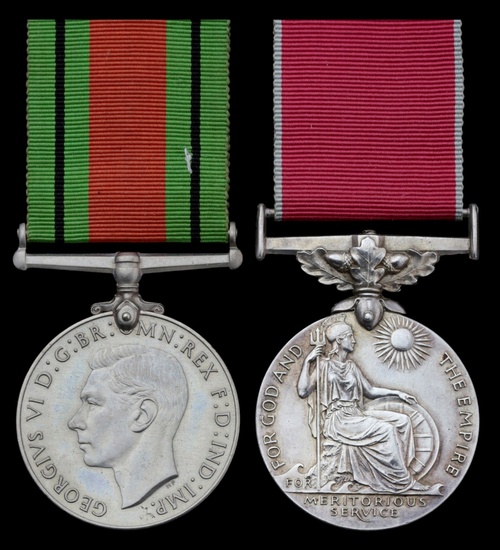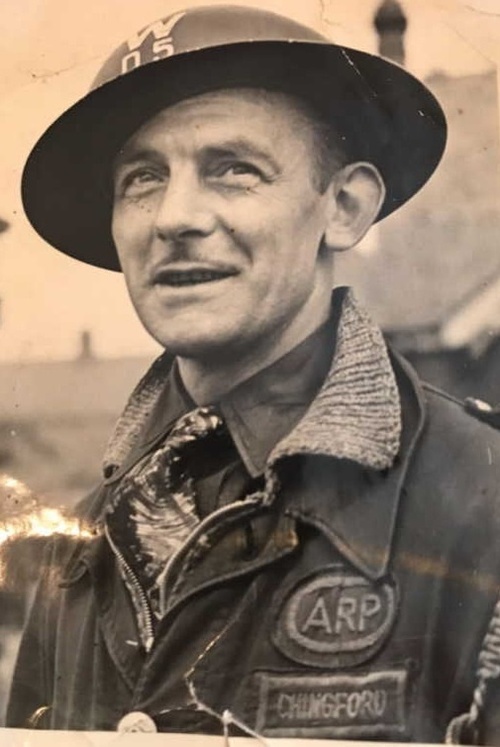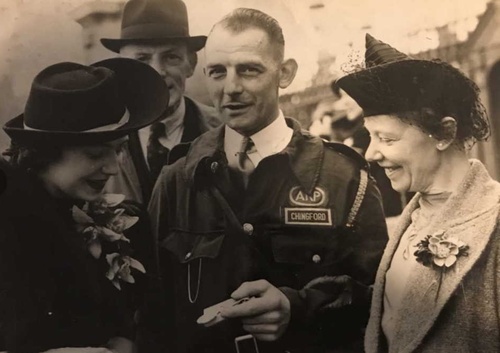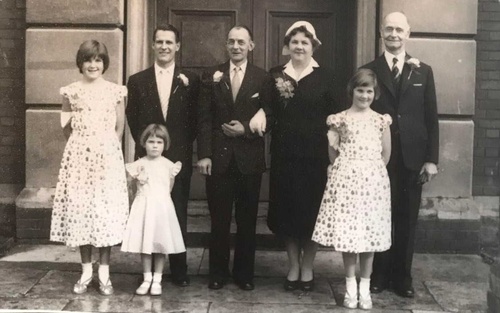Auction: 22103 - Orders, Decorations and Medals VII - e-Auction
Lot: 646
A very fine 'London Blitz 1 October 1940' B.E.M. pair awarded to Senior Warden B. S. Musgrave, Air Raid Precautions, Chingford, for his gallant actions following the detonation of a parachute mine in Royston Avenue
British Empire Medal, for Meritorious Service (Civil), G.VI.R. (Benjamin Stanley Musgrave), officially engraved naming; Defence Medal 1939-45, good very fine (2)
B.E.M. London Gazette 28 March 1941. The citation, together with a George Medal to John Llewellyn Davies, states:
'During a heavy air raid [on 1 October 1940] several houses were destroyed. The debris caught fire and blazed fiercely.
Fireman Davies' house was severely damaged and he was badly shaken. Immediately he had recovered he went to a wrecked house in which two persons and a child were trapped under a bed.
Having located the casualties, he burrowed into the debris with bare hands. He succeeded in reaching the bed and, finding the baby, he passed it to the Wardens. He then tried to release the other victims. This he could not do unaided and Warden Musgrave volunteered to help him.
Davies then levered up the debris with his body whilst Musgrave crawled under the bed and allowed himself to be pulled out with the woman on his back.
Still taking the weight of the debris, Davies, after fifteen minutes, succeeded in releasing the remaining trapped person, who was then drawn to safety.
Davies was in a state of collapse and had to receive first aid treatment but, when it was reported that another child was trapped, he again crawled under the wreckage and continued working for the rest of the night. His heroic action saved many lives.'
Stanley William Musgrave was born on 9 January 1906 at Stoke Newington and would have been too young to see active service during the Great War. By 1939, he was an upholsterer living at 8 Epping Glade, Chingford and was a Senior Warden in the Air Raid Precautions. His B.E.M. was won on the night of 1 October 1940, with the Blitz in full flow and Royston Avenue being the site of his gallant acts. The events were recalled by Robert Barltrop in Bright Summer Dark Autumn:
'The most fearsome of all the bombs was the land mines dropped on parachutes. They did tremendous damage because they exploded above ground, when they touched the roofs of buildings as the wind carried them. I had just left the Town Hall one night when I saw one of them floating down some way ahead of me. Searchlights were clustered on it, following its slow descent. As I got near the Crooked Billet, it went out of sight; there was a great flash and bang. I realised it could not be far from my home. The mine had exploded on Westcott’s laundry behind the shops in Chingford. When I reached the area fire and rescue vehicles and ambulances were there and people flocking this way and that, some in night clothes.
The main damage was in Royston Avenue, to one side of the laundry. Blacking-out was abandoned; the lights were on in houses whose windows were shattered, while the rescue men had floodlights on the wreckage. Near the corner of the road a fireman passed me carrying a little girl. Our house was undamaged. My mother was subdued and frightened. Front doors were opened; careless of the blackout, neighbours went to and fro to speak to one another and pass on information. My father went up the road in search of news, several of the Royston Arms crowd had lived where the mine had fallen. He was away a long time, and came back with a family we knew. They were a couple about my parents’ age, with two daughters in their teens. They stayed with us for two weeks, sleeping in the front room, until they found another home. A possession of theirs dropped on Westcott’s Laundry, and bed-side lamp in the shape of an owl, was left behind and stayed in Salisbury Hall Gardens. Whenever I looked at it I thought of the bombed-out family sitting with us on the night of the land-mine.'
Despite their efforts, CWGC records four civilian deaths on Royston Avenue on the night of 30 September-1 October 1940. They were Ruby Lambert (aged 19), William (aged 48) & Anne (aged 46) Kingdon and Louisa Church (aged 59).
Musgrave went up to Buckingham Palace to get his richly-deserved award. It appears his first wife was killed in an air raid in 1942 and he then lived with Doris Stimpson. The pair had a daughter, Leslie, who was born in 1943 but soon fell out and separated. It was not until October 1953, that Musgrave made history in the Courts by being the first father to be granted custody of a child (Daily Mirror 30 October 1953, refers). He moved away from London and married again in 1959 at Winchester and died in 1977 at Southampton.
Sold together with a number of copied images of Musgave in his A.R.P. uniform and after the Investiture.
Subject to 20% VAT on Buyer’s Premium. For more information please view Terms and Conditions for Buyers.
Sold for
£2,400
Starting price
£320











